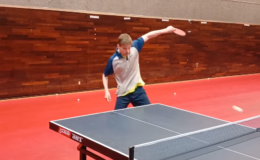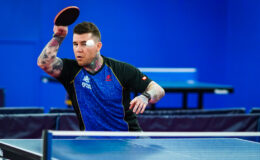By Larry Hodges, USATT Hall of Famer and National Coach
Recently I had an epiphany. It wasn’t anything that wasn’t obvious, but it was something that underlined a primary difference between hackers and pros – or more generally, between lower-level and higher-level players. And that is the habit of balance.
While practicing with a student, I hit a net ball to the right-handed student’s forehand side. The student immediately reached for the ball. This put his weight on his right foot. Since he could no longer step with that foot (try it, you’ll see), he was forced to lunge for the ball. He managed to reach it and popped it back on the table, an easy winner for any decent opponent. On the very next point, the student hit a net-edge to my forehand. When it nicked the net, without thinking I stepped toward where the ball was going. When it hit the edge, I took an immediate step sideways toward the ball’s new direction, and without ever losing balance, reached the ball and made an easy and effective return.
The epiphany was that I didn’t have to think about getting the net-edge, or reach for it, or even make a weak return, though that is often the result. The habit of balance took over, and so rather than lunging toward the ball, the years of training took precedence, with the result that I stepped to the ball, and reached the ball in perfect balance to make the shot.
This is not a matter of practicing balance while returning nets or edges. It’s a matter of practicing balance all the time, always stepping to the ball, always balanced, rarely lunging. (There are rare occasions where you step to the ball and then have to make a last-second lunge at a ball that’s otherwise out of reach, but that’s as a last resort, and only after stepping first. And you’ll be surprised at how balanced you can be even when lunging.)
So develop the habit of always staying balanced, and stepping toward shots, not reaching. This makes it easy to move in any direction and ready to make a strong shot. It’s that first move – stepping that keeps you in balance versus reaching that puts you off balance – that makes the difference.



